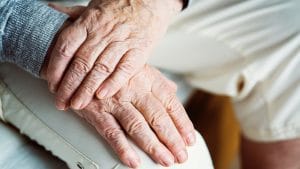What Is Sleep Paralysis and Why It’s So Dreadful?
written by / September 12, 2022

If you’re only wondering “what is sleep paralysis” and how it feels, you’re one of the lucky ones! This horrifying sleep phenomenon can make you feel an evil presence in your room that wants to harm you while you lie motionlessly, feeling unable to defend yourself.
Although usually harmless, sleep paralysis can make you lose sleep and become sleep-deprived and anxious. So, let’s dive deeper into this mysterious state and find out what triggers it, how to get rid of it, and so much more!
What Is Sleep Paralysis?
Sleep paralysis isn’t a new phenomenon. The first clinical records about sleep paralysis date back to 1664, but humans had been experiencing this nighttime inconvenience and struggled to understand it way before that.
Sleep Paralysis — Understanding Sleep Paralysis Through History
Due to the unique horrifying experience it provides, the phenomenon was initially associated with demons and spirits (later even alien abductions), and these creatures commonly have a starring role in various sleep paralysis hallucinations.
Dr. Samuel Johnson came the closest to capturing the essence of this phenomenon by defining it as a “nightmare” in his 1755 dictionary and describing it as “a morbid oppression in the night, resembling the pressure of weight upon the breast.”
What Happens During Sleep Paralysis?
Sleep paralysis is way more than an unpleasant feeling of pressure on your chest. It’s a type of parasomnia — a sleep disorder that involves unusual and involuntary behavior and experiences during sleep.
It’s most frequently described as waking up to a horror-movie-worthy scene (hearing horrible sounds, seeing terrifying creatures, smelling unpleasant smells, etc.) without being able to move, speak, or react in any way.
But you can also experience sleep paralysis without hallucinations.
Most sleepers are aware of what’s happening during a sleep paralysis episode — they realize they’re dreaming. However, at the same time, they can’t move or do anything to escape the dream, which is why this phenomenon is so scary.
Why Does Sleep Paralysis Occur?
There’s a simple explanation for this. Sleep paralysis usually occurs during one of the most intense of the five sleep stages — the REM (rapid-eye-movement) stage. This is when our brains are most active and when most of our dreaming occurs.
This is also when our muscles are very relaxed, paralyzed even, to keep us from acting out on our dreams. And this is when sleep paralysis strikes.
During sleep paralysis, muscle paralysis (atony) continues even when the mind is already awake.
Sleep Paralysis and Hallucinations
About 75% of those who experience sleep paralysis have hallucinations. While people usually report seeing things that aren’t there, hallucinations aren’t exclusively visual. They can also be auditory (hearing things that are not there) or olfactory (hallucinating smells).
There are three most common types of hallucinations:
- Intruder hallucination — you sense an evil presence in the bedroom
- Incubus hallucination — you experience tightness in your chest
- Vestibular-motor hallucinations — you’re under the impression that you’re moving or going in and out of your body
The most commonly reported hallucinations include:
- Doors opening
- Animals growling
- The sound of footsteps
- Scratching
- Murderous whispers
- The smell of rotting flesh
There are also people describing an episode of sleep paralysis where a demon is sitting on their chest, immobilizing them. This happens because intruder hallucinations and incubus hallucinations tend to occur together.
Types of Sleep Paralysis
There are three different types of sleep paralysis, classified according to when (in which phase of sleep) they occur:
- Hypnagogic (predormital) sleep paralysis — It occurs as we’re falling asleep. The person remains conscious while the body becomes immobilized and moves into REM sleep. According to a study, more than 25% of SP episodes happen within the first hour of going to sleep.
- Hypnomesic sleep paralysis — It occurs well into the sleep, but before usual waking time and during one of the REM phases in the sleep cycle.
- Hypnopompic (postdormital) sleep paralysis — It occurs as we wake up. The sleeper suddenly awakes before the REM cycle is completed.
Is Sleep Paralysis Common?
Sleep paralysis is a widespread phenomenon affecting almost four out of ten people worldwide. Some studies even suggest a higher prevalence (60%) of this parasomnia. It can affect both men and women, and it’s also common in children and adolescents.
Sleep paralysis episodes most frequently occur in the second and third decades of life, although they may also persist throughout later stages of life. The first episode often occurs in childhood, the teen years (usually between the ages of 14 and 17), or even in young adulthood.
The incidence of sleep paralysis episodes tends to vary. It may only occur once in a lifetime, but it can also happen several times a year, a month, or even weekly, for the most unfortunate. Typically, an episode lasts from a few seconds to a few minutes and then stops on its own.
What Causes Sleep Paralysis?
Sleep experts still aren’t sure exactly which mechanisms lead to sleep paralysis. But they seem to be nearing the answer.
Researchers have been successful in inducing artificial sleep paralysis experimentally. They chemically disrupted REM sleep by using a substance called gamma-aminobutyric acid (GABA) and glycine. Multiple other theories exist, but there’s no definitive answer yet.
However, over the years, many factors have been identified as potential causes for this parasomnia:
- Genetics (a family history of sleep paralysis)
- Narcolepsy
- Other sleep disorders (e.g., chronic insomnia, obstructive sleep apnea (OSA), etc.)
- Nighttime leg cramps
- Irregular sleep patterns (due to jet lag, shift work, etc.)
- Sleep deprivation
- The use of certain medications (e.g., ADHD medications)
- Substance abuse
- Withdrawal from antidepressants, hypnotics, and alcohol
- A stressful life event
- Early childhood trauma (e.g., sexual abuse or a violent accident)
- Migraines
- Sudden environmental changes
- Changes in one’s daily routine or lifestyle
- Certain sleeping positions (e.g., sleeping on your back with arms crossed over your chest)
- Certain mental disorders (e.g., depression, panic disorder, PTSD, bipolar affective disorder, etc.)
Recognizing the Symptoms of Sleep Paralysis
Sleepers report a wide variety of sleep paralysis symptoms:
- Inability to move your body (or parts of the body)
- Inability to speak
- Feeling pressure on your chest
- Difficulty breathing
- Hallucinations
- A clear perception of your environment and surroundings
- The inability to overcome an episode’s fear and horror
- The impending sense of doom
- Profuse sweating
- Migraine/headache
- Muscle pains
- Paranoia
- Light sensitivity
- Increased sensitivity to noise
How Serious Is Sleep Paralysis?
You’ll be relieved to find out that, terrifying as it is, sleep paralysis is usually harmless and doesn’t cause any other sleep or health problems. SP episodes are usually rare and nothing to worry about.
Studies found that only around one in ten patients experience severe and frequent sleep paralysis, which should be taken seriously as a subject of treatment. And keep in mind that only recurring sleep paralysis should be considered a good reason to go and see your doctor.
And now, to tackle the question that’s been bothering many — can you die from sleep paralysis? The answer is a resounding no!
Sleep Paralysis — Complications
Though sleep paralysis isn’t a medical condition per se, it can cause lots of discomfort in the long run and even trigger certain medical conditions.
So, SP sufferers are often at risk of:
- Developing somniphobia (fear of falling asleep)
- Attributing religious or superstitious meaning to the event
- Developing anxiety
- Severe sleep deprivation
- Inability to perform daily tasks and obligations (about 7% of SP patients are affected in this way)
If your sleep paralysis is recurrent and you experience complications described above, you may need to seek treatment for sleep paralysis.
Diagnosing Sleep Paralysis
There are no medical tests designed specifically for diagnosing sleep paralysis (the reason for this may partly lie in the fact that sleep paralysis isn’t considered a medical condition). Instead, SP diagnosis is based on your personal health history.
Therefore, the doctor will ask you to discuss your symptoms, your health history, and your family sleep disorder history to exclude other medical conditions resembling sleep paralysis. They may also ask you to keep a sleep diary for a while.
In some cases, a polysomnography test (an overnight sleep study used to diagnose various sleep disorders) is also required.
What’s the Best Sleep Paralysis Treatment?
As mentioned above, infrequent isolated cases of sleep paralysis typically require no treatment.
But if sleep paralysis is causing you immense discomfort and starts affecting your day-to-day life (e.g., the symptoms give you severe anxiety and prevent you from sleeping, you’re so tired and sleep-deprived you can’t function during the day), you should seek treatment.
You should know that there’s no universal treatment for sleep paralysis that can help all those suffering from it. Instead, treatment aims to control the underlying cause and varies depending on each individual case.
Therefore, sleep paralysis treatments most commonly entail preventative measures that can help you reduce and even completely eliminate the horrifying episodes.
The first step is always to try to improve the quality of your sleep. This can mean a lot of things:
- Regulating your sleep
- Creating a relaxing sleeping environment (e.g., using soothing essential oils for sleep)
- Taking prescription medication, etc.
However, you should be careful when taking some antidepressants and hypnotics. They can affect the quality of your REM sleep and sometimes make matters worse.
For example, SSRIs (selective serotonin reuptake inhibitors) are known to suppress REM and are proven to make parasomnias worse.
Tricyclic antidepressants like imipramine and clomipramine, on the other hand, give good results in sleep paralysis treatment. Narcolepsy medication like clomipramine can also help (if narcolepsy is the root cause of SP).
How to Stop a Sleep Paralysis Episode
The key to stopping an ongoing episode of sleep paralysis is simply to stay calm and relaxed.
Surely, when faced with an “evil apparition” or other bizarre hallucinations, this is a difficult thing to do. However, being aware that what you’re experiencing isn’t real can help you cope more easily with sleep paralysis.
How else to get out of sleep paralysis?
Another thing that can make episodes “happier” is the so-called positive visualization technique. It consists of practicing wishful thinking and positive thoughts before going to sleep and during sleep paralysis.
Many sleepers report that trying to make small movements helps them break out from a sleep paralysis episode (e.g., trying to move one finger, then others, one by one).
How to Prevent Sleep Paralysis
It’s often difficult to prevent sleep paralysis episodes in susceptible individuals.
Still, there are some things you can do to improve your sleep quality and reduce the frequency of sleep paralysis episodes (or even eliminate them completely):
- Avoid falling asleep on your back.
- Get more comfortable in your bed with a good mattress topper.
- Do what you can to avoid repeatedly waking up during the night.
- Maintain good sleep hygiene (this is the simplest effective sleep paralysis cure)
- Reduce alcohol and cigarette use.
- Practice CBT (Cognitive Behavioral Therapy) if you suffer from anxiety, depression, or PTSD.
- Change any medical treatment that can affect your sleep.
- Practice meditation and muscle relaxation techniques.
- Manage your stress (with medication if necessary)
- Use high-quality anti-snoring devices or a CPAP machine to treat your OSA, etc.
And if you thought that sleeping with a partner might chase the sleep demons away, better think again! There’s no correlation between sleeping with or without a partner and the chances of experiencing sleep paralysis.
However, having someone around might prove useful since any touch or sound usually breaks the hallucination.
Bottom Line
Experiencing sleep paralysis isn’t the end of the world, and you don’t have to be haunted by this parasomnia until the rest of your life. There are many things you can do to prevent future episodes and restore your joy of sleeping.
Most importantly, sleep paralysis is usually harmless (sleep paralysis and death aren’t associated in any way) and lasts only for a couple of minutes.
The most important thing to do during an episode is to stay calm, however challenging it may seem, and you’ll soon get back to reality.
FAQs
Why does sleep paralysis happen?
Sleep paralysis is a consequence of the brain’s bad management of switching between sleep stages. The “error” happens in the REM (rapid eye movement) phase of sleep, when the brain is the most active.
As a consequence, you’re wide awake while your body is still sound asleep.
This mismanagement doesn’t usually happen as an accident. It’s typically triggered by environmental (jet lag), lifestyle (alcohol abuse), genetic (a family history of sleep paralysis), and other factors.
What are the symptoms of sleep paralysis?
The most common symptoms of sleep paralysis include:
- Inability to move
- Inability to speak
- Hallucinations
- Fear and panic
- Chest tightness
- Difficulty breathing, etc.
Can sleep paralysis hurt you?
Despite its startling nature, sleep paralysis isn’t a serious medical condition and typically won’t result in anything concerning.
You shouldn’t be alarmed by episodes that aren’t too frequent. Only around 10% of SP patients will develop frequently recurring sleep paralysis that affects their day-to-day life and requires medical testing and treatment.
That said, some consideration should be given to the psychological concerns that may be causing sleep paralysis. Addressing traumatic events should be a priority if hallucinations are obviously related to a traumatic event.
Can sleep paralysis kill you?
You may feel like you’re going to die during a sleep paralysis episode, but this is actually impossible. There’s no credible evidence that this condition has ever been a cause of death.
While there are other sleep-related deaths, none are proven to be connected to sleep paralysis.
While theoretically possible, it’s challenging to find a direct relationship between sleep paralysis and death. So, even if death did occur during a sleep paralysis episode, it would probably be related to another illness and not the phenomenon of sleep paralysis itself.
Why is sleep paralysis so scary?
The primary symptoms of sleep paralysis include the inability to move and sometimes even being unable to breathe normally. This parasomnia may also be accompanied by terrible hallucinations and a great sense of danger.
Sleep paralysis is especially frightening because these hallucinations are sometimes incredibly vivid and, more often than not, threatening. Luckily, sleepers are often able to interpret the experience as a dream rather than an actual event and spare themselves the stress.
How can sleep paralysis be prevented?
We may not know precisely how to stop sleep paralysis forever, but there are many ways to prevent sleep paralysis episodes and reduce their number.
Treating underlying medical disorders (e.g., narcolepsy, anxiety, or insomnia) is likely the best way to prevent sleep paralysis.
Other ways to manage the condition include improving your sleep habits, treating any mental health problems, taking antidepressant drugs (if prescribed), etc.
The aim is to regulate your sleep cycle and avoid any triggers that may contribute to sleep paralysis.
That said, educating yourself on this scary parasomnia is the best prevention you can hope for. Overcoming a sleep paralysis is undoubtedly easier once you know the answer to “what is sleep paralysis,” how harmless it is, and what you can do to prevent and stop it.
Table of Contents
What Is Sleep Paralysis?
Sleep Paralysis and Hallucinations
Types of Sleep Paralysis
Is Sleep Paralysis Common?
What Causes Sleep Paralysis?
Recognizing the Symptoms of Sleep Paralysis
How Serious Is Sleep Paralysis?
Sleep Paralysis — Complications
Diagnosing Sleep Paralysis
What's the Best Sleep Paralysis Treatment?
How to Stop a Sleep Paralysis Episode
How to Prevent Sleep Paralysis
Bottom Line
FAQs
Table of Contents
What Is Sleep Paralysis?
Sleep Paralysis and Hallucinations
Types of Sleep Paralysis
Is Sleep Paralysis Common?
What Causes Sleep Paralysis?
Recognizing the Symptoms of Sleep Paralysis
How Serious Is Sleep Paralysis?
Sleep Paralysis — Complications
Diagnosing Sleep Paralysis
What's the Best Sleep Paralysis Treatment?
How to Stop a Sleep Paralysis Episode
How to Prevent Sleep Paralysis
Bottom Line
FAQs









Warning: Undefined array key "format" in /home/602518.cloudwaysapps.com/cspedpjass/public_html/wp-content/themes/disturbmenot/template-parts/post-item/post-comment.php on line 23
Warning: Undefined variable $commenter in /home/602518.cloudwaysapps.com/cspedpjass/public_html/wp-content/themes/disturbmenot/template-parts/post-item/post-comment.php on line 27
Warning: Trying to access array offset on value of type null in /home/602518.cloudwaysapps.com/cspedpjass/public_html/wp-content/themes/disturbmenot/template-parts/post-item/post-comment.php on line 27
Warning: Undefined variable $commenter in /home/602518.cloudwaysapps.com/cspedpjass/public_html/wp-content/themes/disturbmenot/template-parts/post-item/post-comment.php on line 29
Warning: Trying to access array offset on value of type null in /home/602518.cloudwaysapps.com/cspedpjass/public_html/wp-content/themes/disturbmenot/template-parts/post-item/post-comment.php on line 29